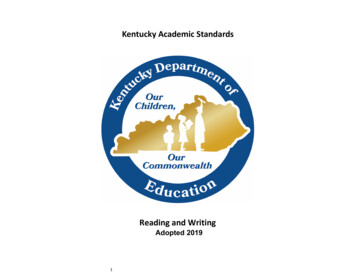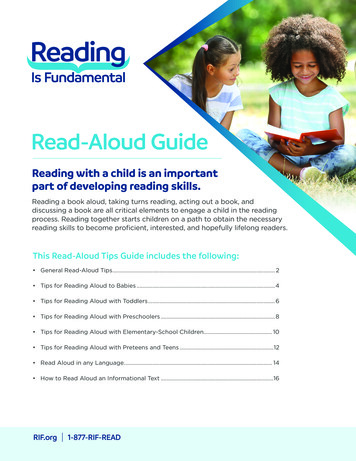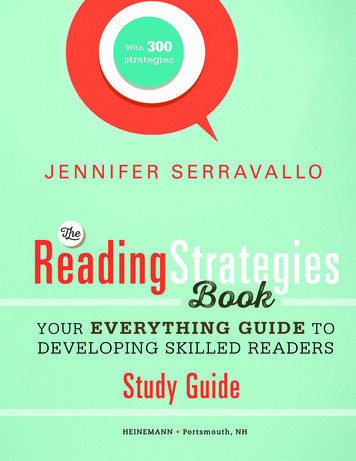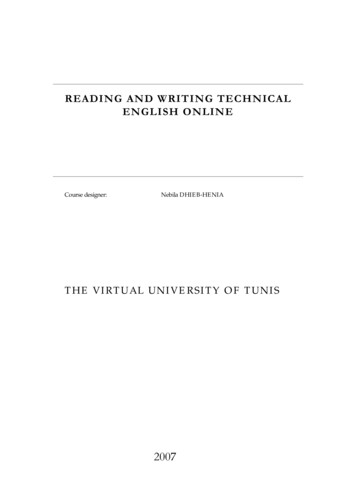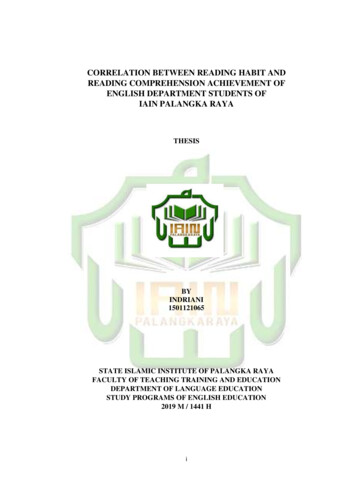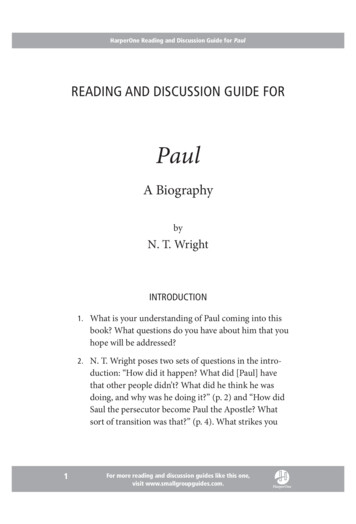
Transcription
HarperOne Reading and Discussion Guide for PaulREADING AND DISCUSSION GUIDE FORPaulA BiographybyN. T. WrightINTRODUCTION1. What is your understanding of Paul coming into thisbook? What questions do you have about him that youhope will be addressed?2. N. T. Wright poses two sets of questions in the intro-duction: “How did it happen? What did [Paul] havethat other people didn’t? What did he think he wasdoing, and why was he doing it?” (p. 2) and “How didSaul the persecutor become Paul the Apostle? Whatsort of transition was that?” (p. 4). What strikes you1For more reading and discussion guides like this one,visit www.smallgroupguides.com.
HarperOne Reading and Discussion Guide for Paulabout these questions that Wright leads off with? Dothey introduce a new way of thinking about Paul, or dothey echo questions you already had?PART 1: BEGINNINGSCHAPTER 1:ZEAL1. “And that is why some Jews, and [Paul] among the . . .followed the ancient tradition of ‘zeal’ ” (p. 29). Whatwas this “ancient tradition of ‘zeal’ ”? How did it informPaul’s thoughts and actions?2. Describe one thing that you learned from this chapterabout how Paul viewed the early Christian movement.Why did he respond to that movement in the way thathe did?CHAPTER 2:DAMASCUS1. When describing Paul’s “road to Damascus” experience,Wright poses the questions, “What was going on inSaul’s mind and heart that day? What transformed thezealous persecutor into the zealous apostle?” (p. 41).Before reading this chapter, how would you haveanswered these questions? How would you answerthem now?2For more reading and discussion guides like this one,visit www.smallgroupguides.com.
HarperOne Reading and Discussion Guide for Paul2. “To explain what [Paul encountering Jesus on the roadto Damascus] meant in the language of psychologywould be like trying to copy a Titian with a child’s crayons. To understand the explosion that resulted, we needhistory, we need theology, we need a strong sense of theinner tensions of the first-century Jewish world and thezealous propagators of Jewish culture” (p. 52). Why ispsychology not enough for interpreting Paul’s conversion and its influence on Christianity?3. What do we learn about this moment in Paul’s life byplacing him in his historical, theological, social, andpolitical contexts?CHAPTER 3:ARABIA AND TARSUS1. In answer to the question about why Paul traveled toArabia, Wright states, “The clunky, obvious, straightforward answer is that Paul was eager to tell peopleabout Jesus and that Arabia was where he went on hisfirst ‘evangelistic mission’ ” (p. 62). Why does Wrightclaim that this answer is “almost certainly wrong”(p. 62)? What evidence supports this claim?2. Wright describes a “silent decade” in Paul’s life fromroughly 36 ce to 46 ce, when he was in Tarsus (p. 68).What was Paul doing during this time? How did theseyears of silence shape his life and ministry?3For more reading and discussion guides like this one,visit www.smallgroupguides.com.
HarperOne Reading and Discussion Guide for PaulCHAPTER 4:ANTIOCH1. “In Antioch a wall had been breached. A crack hadappeared in an age-old dam” (p. 85). To what is Wrightreferring here? What was at stake in this situation, andwhat impact did it have on Paul’s life and ministry?2. Wright suggests that the situation in Antioch produced“a project (though they couldn’t have foreseen this atthe time) that with long hindsight we might call ‘Christian theology’ ” (p. 91). How so?PART 2: HERALD OF THE KINGCHAPTER 5:CYPRUS AND GALATIA1. Writing about Paul’s motivation and success, Wrightnotes, “What made him tick? And why did it work?”(p. 104). Before reading this chapter, how would youhave answered this question? How would you answerit now?2. Do you think of Paul’s vision of the kingdom as “politi-cal” (p. 106)? If so, how so? If not, why not?4For more reading and discussion guides like this one,visit www.smallgroupguides.com.
HarperOne Reading and Discussion Guide for PaulCHAPTER 6:ANTIOCH AND JERUSALEM1. Wright claims that “oversimplifications . . . have all tooeasily crept into readings of Paul. This has been a particular problem for modern Western readers” (p. 141).Has this revealed any oversimplifications in your ownreading and understanding of Paul?2. “Four things then happened in quick succession” after“people in Jerusalem heard what Paul was doing andteaching and reacted with alarm” (p. 142). What werethese four things, and why are they significant?CHAPTER 7:INTO EUROPE1. “Exactly in line with Jesus’s own announcement ofGod’s kingdom, which took normal political values andpower structures and stood them on their heads, Pauland his friends were announcing and modeling in theirown lives a different way of being human, a differentkind of community, and all because there was a verydifferent kind of ‘king’ ” (p. 186). What did this different way of being human and in community look like?How have you seen something like this in your ownfaith journey?2. “ ‘The son of God loved me,’ Paul had written to theGalatians, ‘and gave himself for me.’ What we see asPaul makes his way around the cities of northern5For more reading and discussion guides like this one,visit www.smallgroupguides.com.
HarperOne Reading and Discussion Guide for PaulGreece is what that love looks like when it translatesinto the personal and pastoral ministry of the sufferingand celebrating apostle” (p. 191). According to Wright,how does Paul display this love during his travels inand around northern Greece?CHAPTER 8:ATHENS1. How does Wright’s fresh take on the historical and cul-tural contexts of Acts 17 (p. 194) affect how you nowread and understand this key moment in Paul’s life andministry?2. How does Paul come across as both a “Jewish thinker”(p. 199) and a “Roman citizen” (p. 200) during hishearing before the Areopagus?CHAPTER 9:CORINTH I1. About the city of Corinth, Wright notes, “We watch, ina way we cannot do with any of Paul’s other churches,as a community comes to terms with what it meant tobe Messiah people in a world full of challenges andquestions” (p. 209). What similarities and differencesdo you see between the world faced by the ancientCorinthians and us today?6For more reading and discussion guides like this one,visit www.smallgroupguides.com.
HarperOne Reading and Discussion Guide for Paul2. “This was a momentous event in the history of thechurch, and one wonders if even Paul had seen it coming” (p. 229). To what is Wright referring here? Whatwas at stake in this event, and what impact did it haveon Paul’s life and ministry?CHAPTER 10:EPHESUS I1. Writing about Paul’s time in Ephesus, Wright claims,“Paul must have loved those days. He was busy in theshop and busy teaching. People crowded into his lectures, brought sick people for healing, and turned tolook as he went by. Jesus was Lord, and he was hisapostle” (p. 247). How does Wright make sense ofPaul’s “success” in Ephesus? Why didn’t this successlast? Why do both matter for understanding Paul assimultaneously a person and an apostle?2. “I think that, like a plant in harsh winter, Paul in prisonwas forced to put his roots down even deeper than hehad yet gone into the biblical tradition, and deeperagain, still within that tradition, into the meaning ofJesus and his death. The roots slowly found moisture.From the depth of that dark soil, way below previousconsciousness, he drew hope and new possibilities”(p. 268). How does a moment like this help us see howPaul’s theology and ministry were profoundly shapedby his own life experiences? Why do we rarely think ofPaul as influenced by these things?7For more reading and discussion guides like this one,visit www.smallgroupguides.com.
HarperOne Reading and Discussion Guide for PaulCHAPTER 11:EPHESUS II1. “Paul is using letters to teach his churches not justwhat to think, but how to think” (p. 274). Throughoutyour life, who has helped you learn how to think “asthe Messiah had thought”? Have you ever thankedthem?2. “Most modern Western critics still express doubtsabout Paul’s authorship of one or both of these letters[Colossians and Ephesians]” (p. 285). How does Wrightrespond to these doubts? What do you make of hisargument?CHAPTER 12:CORINTH II1. About Paul’s letter to the Romans, Wright claims, “Theletter is not simply a summary of everything Paul hadbeen teaching. It is designed to make vital points to thechurch in Rome” (p. 318). How does learning moreabout the context of this important letter influence howyou read and understand it?2. “[The letter to the Romans] is one of the most ecstaticand exhilarating, dense and difficult, intellectually andspiritually challenging, and rewarding writings fromany period of church history and, some might argue,from anybody else’s history as well” (p. 337). What has8For more reading and discussion guides like this one,visit www.smallgroupguides.com.
HarperOne Reading and Discussion Guide for Paulbeen your experience with Paul’s most famous letter?Where have you encountered its difficulty? Where haveyou enjoyed its reward?CHAPTER 13:JERUSALEM AGAIN1. Wright refers to Paul’s trip to Jerusalem as a “great col-lection project” (p. 339). Why does he describe it thisway? What becomes of this project?2. Paul’s message was “the Jewish message reshapedaround Jesus: people should turn from idols and servethe living God now made known in Jesus. That messagehas not changed from his early days, and it was stillwhat a great pagan city needed to hear” (p. 346). Howwas this message received?PART 3: THE SEA, THE SEACHAPTER 14:FROM CAESAREA TO ROME—AND BEYOND?1. According to Wright, why does the book of Acts stopwhere it does (p. 391)?2. Wright claims, “I have become more open to the possi-bility of [Paul’s] return visit to the East after an initialhearing in Rome” (p. 397). How does he support thisclaim? What do you make of his argument?9For more reading and discussion guides like this one,visit www.smallgroupguides.com.
HarperOne Reading and Discussion Guide for PaulCHAPTER 15:THE CHALLENGE OF PAUL1. For Paul, Jesus was both “the starting point” and “thegoal” (p. 401). What does Wright mean by both of these,and how did they influence Paul’s life and ministry?2. “Paul’s letters wait for us just around the corner, to takeour arm and whisper a word of encouragement when weface a new task, to remind us of obligations and warn usof snakes in the grass, to show us from one angle afteranother what it might mean to live in the newly humanway, the newly Jewish way, the way of Jesus, to unveilagain and again the faithful, powerful love of the creatorGod” (p. 420). Would you add or change anything toWright’s description of Paul’s letters?FINAL QUESTIONS1. How has reading this book changed your understand-ing of the person, life, writings, and/or ministry ofPaul?2. How has reading this book changed your understandingof God, the gospel, and/or the nature of Christianity?10For more reading and discussion guides like this one,visit www.smallgroupguides.com.
HarperOne Reading and Discussion Guide for Paul For more reading and discussion guides like this one, visit www.smallgroupguides.com. 1 Paul A Biography by N. T. Wright INTRODUCTION 1. What is your understanding of Paul coming into this book? What questions do you



